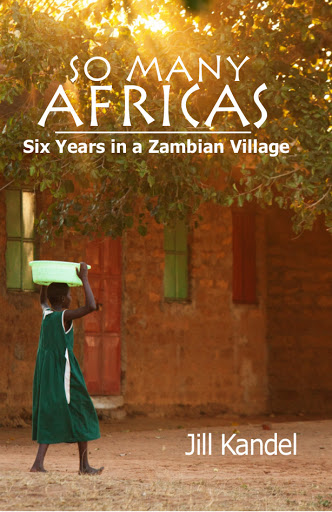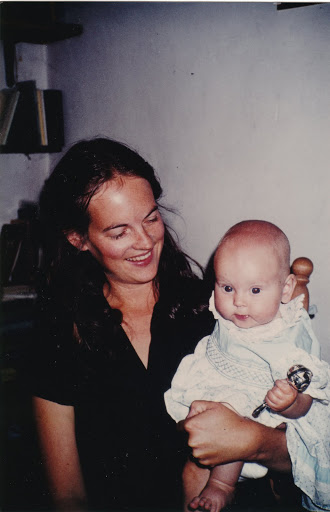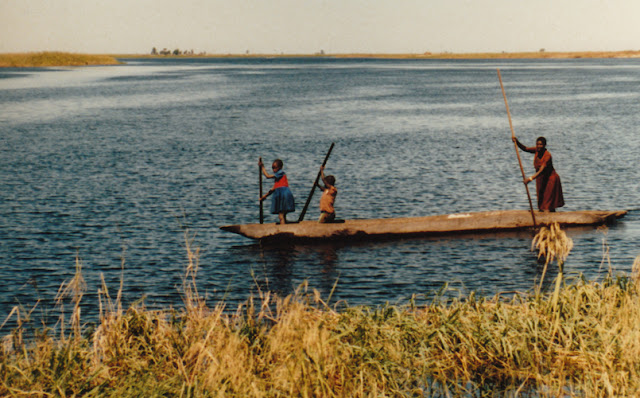Have you ever wondered what it would REALLY be like to live in Africa? Not the Africa of tourists, or the Africa of locals (because we’re not locals), but the Africa of an expat. I have wondered about Africa, because I was an expat in Japan, which is also radically different from the US. What is it like to live in a completely different culture than your own? What cultural adjustments will you have to make, what will surprise you, and what impact will your time in Africa have, when you return home?
“I am at peace. And I am not.
I have been gone for three years. It’s so odd, like stepping back into history. Like erasing three years of my own life. It’s like I have forgotten who I am.”

All of this is answered, and more, beautifully, in So Many Africas: Six Years in a Zambian Village, by Jill Kandel, winner of the Autumn House Nonfiction Prize. This is a thoughtful book, written many years later, one that takes the entire scope of an expat experience in Africa and looks at it with the long view. When you’re an expat, things have immediate impact. When you return, you’re coping with re-entry shock. Only years later can you unpack your time living abroad with clarity and thoughtfulness. So Many Africas is an extremely thoughtful book, one that doesn’t flinch from the hard stuff, but digs in deeply and fully explores cross-cultural living.
“What will you do with these tactile memories – closer to you than your own skin – inside the myelin of your nerves? Think about those six years, so long ago, when what was remarkable became common, when what was astounding became everyday and overlooked. How you buried your observations, leaving them for dead. If you are to survive, you must go back. You must find this place again, and let it brim your eyes.”
One of the things I loved most about So Many Africas is Kandel’s unflinching look at her life in Africa, and how it has affected her (and her family) since then. I have never seen a book that so fully explored the experience of living abroad - and coming home. From her friendships to her family, from the difficulties of living in a rural African village to having and raising children so far from home, from a new marriage to growing up together, this book covers it all – deeply, thoughtfully, and clearly.
I devoured So Many Africas, and was touched on many levels. I felt an inkling of Kandel’s struggles, homesickness, language difficulties, and cultural adjustment. I loved her honesty about a new marriage being tested in a new environment, of how much of expat life is consumed by small, daily details that take up so much time, of coming home and trying to make sense of this enormous life experience. But it is Kandel’s journey – and writing – that crystallizes her experiences – and gives us a pathway to view our own international lives.
“Are our lives not the same? Is there ever one without the other? But how do you live when these are your memories, quicksand and quivering?
Look back. Look through the rim and overflow, to a body pulled over the falls, swirling in the basin. Finger the thorn, feel the point, mark out the blood. And write.”
Highly, highly recommended.
We were lucky enough to catch up with Jill Kandel, and ask about the book, inspiration, the writing process, being an expat, and more. Here’s what she had to say…

Please tell us about your book, So Many Africas...
So Many Africas: Six Years in a Zambian Village is a narrative memoir. I grew up in North Dakota with a love for reading, exploration and travel. In 1981, I married a man from the Netherlands and six weeks later we moved to Zambia. We got off the airplane in the capital city of Lusaka and then took a ten-hour bus ride west. Next, we hired a canoe and proceeded west across the Zambezi Flood Plain. We got out of the canoe ten hours later in a village called Kalabo. We lived there for six years. My book is about those years. It is also about coming back to live in the states after living abroad for ten years. I “came home” to find that home wasn’t home, because I wasn’t the same person anymore. The book circles around themes of cross-cultural living including both the joys and the frustrations. It’s about cross-cultural marriage, the births of our two children in the village, and trying to reconcile the griefs and the glories of being pulled into another culture for an extended period of time.

What inspired you to write this book?
When I returned to North Dakota, I thought that I left Africa behind. But we had so many experiences I didn’t understand that my mind wasn’t at peace. I started to dream about Zambia and had recurring nightmares. I began to write in order to sort out the confusion. There were five languages spoken in our village: SiLozi, Mbunda, Luvale, Nyengo, and Nkoya. I never learned any one of them very well and struggled to communicate the entire time we lived in Zambia. When you can’t communicate well, a part of your thought life changes. You begin to think in short, staccato sentences. I didn’t realize that living like that for six years affected me so much. Those years held a lot of silence. I needed to fill in the silence with words. I needed to understand those years.
I've never read a book that so completely took the reader to a place. Was it challenging to relive and write? How did your writing process work?
Finding the facts didn’t prove too difficult. I researched our documents, letters, journals, photographs and film footage. My mother saved every letter that I wrote to her, so there was plenty of raw data. The difficult part was to go back emotionally, to be there again. When we lived in Zambia, I was so busy with day to day survival that I didn’t have the time or the energy to be self-reflective. I stuffed my feelings and emotions much of the time. When I began to read the letters, I knew they weren’t completely honest. They were sugar-coated. I had to allow myself to feel. I had to give myself permission to go back and relive the pain. What I found was that the more I wrote and remembered the hard things, the more I began to remember the beauty, too. I wrote four separate drafts of this book. The first one was awful! “We did this. We did that.” It was like a bad diary. I didn’t like it, but wasn’t comfortable writing novel length, so I wrote a series of essays, eight of which were published. After I had created a book of essays, I found nobody wanted to publish it, so I did the long work of tearing the essays apart and looking at the entirety of the book. I gave it an emotional arc and it seemed to hold together but didn’t feel complete. So I went back and wrote it again adding in a mature voice. That last voice gave the book more depth: who was that young woman and what do you think about her now? I enjoyed exploring the lingering questions, and when the questions no longer haunted me, I knew the book was finished.

Being an expat leaves a lifelong mark on a person, seared into your very self. I think most expats never truly unpack that experience, as you did - what can you recommend expats do, to truly begin to understand their experiences?
The essential component for me was to go beyond the intellectual. I needed to access my emotions. People do that in so many differing ways. For me it was writing. I have other friends who sing, paint, write poetry, dance. I think the arts allow us to process things on a deeper more intimate level which intellect alone can’t do. It also takes time. I didn’t begin writing until we’d been back for ten years. I needed that distance to be able to face my past. In the end, I was simply compelled. I couldn’t not write, if that makes sense. I was driven to write this book. As if something inside of me knew I had to. I believe that we don’t truly understand our lives, especially our trajectory and future, until we go back and remember our past. I was stuck back in the sands of Zambia in so many ways. Going back, as difficult as it was, became a way to freedom.
Sometimes we have to go back physically; this can be another method for people to understand their expat experience. Paul Theroux’s book Dark Star Safari is a great read about his return to Malawi, where he had worked as a young man with the Peace Corp. There is something about allowing yourself to go back and not just push the past away. I found that facing my memories directly was the only way to get past them. So, do whatever it takes for you. I think people know intuitively what step that will be. The question really is about finding the courage to engage with your past. You had the courage to go, to live, to explore. So I wish you that courage again, to go back and make peace with your experiences.
What advice do you have for travelers heading to remote places, for extended periods of time?
Pack light and bring a good filtered water bottle along. Those are my top two pieces of advice. And read extensively before you go. If you research something you will know what you don’t want to do, as much as what you do want. When I went to New York City for the first time, I spent two months dreaming about what I’d see and do. I quickly crossed the ‘official tourist destinations’ off my list. I spent most of the ten days walking the city, especially going to various outdoor graffiti art locations. I was comfortable in the city partly because of the research.
Connecting to a location ahead of time, to understand its bigger picture, allows space in your mind to appreciate more of the nuances once you arrive. If you are going to Zambia, you should know about the general history, the copper mines, what items you can purchase in country. If you are going to Western Providence in Zambia, read about the Lozi People and the Kuomboka Ceremony. If a location interests you enough to travel there, then knowing as much as you can before you go makes it a richer experience. You will appreciate the Kuomboka Ceremony much more if you know why the Lozi Peoples are celebrating, what their clothing represents, and the history of the Zambezi flood plain.
There are multiple ways to connect to a location before you travel. Have coffee with someone who is from that area or has traveled there. Watch documentaries and listen to podcasts. Learn some of the language especially the greeting phrases. Read, read, read. There are so many great blogs on travel including Wandering Educators which offers travel guides, services, and suggested items to bring on your trip. Traveling smart has never been easier. And lastly, learn what is culturally offensive: Do men and women shake hands? Can I wear shorts? While trying to blend in may be impossible, you still can be knowledgeable enough not to affront local customs and protocol.

What's up next for you?
I’m blogging about living in-between cultures. It’s great fun. Living in Fargo is an interesting experience. I think we sometimes forget, that every place contains and exhibits culture. We are often blinded to and lose curiosity for our own location. We take for granted what we see every day. So I’m exploring Fargo and looking at it from an outsider’s viewpoint. Besides, I’m tired of being asked (every time I say I’m from Fargo) if I like the movie. I’m trying to educate people: Fargo is more than a movie! In fact, the movie wasn’t even made in Fargo. But that’s another story.
I’m also writing a narrative memoir set in the Netherlands. My husband grew up in the Netherlands. We were married there. All of my in-laws live in the Netherlands. So even though I am living in the United States, I am really still living an intercultural life. I’m studying the Dutch language (again) and immersing myself in trying to understand the Dutch mindset. It is both daunting and exhilarating. I usually write about things I don’t understand. Right now, I’m writing mostly about my father-in-law and his youth growing up in an occupied Netherlands in WWII. He was a difficult man and quite stoic. So I’m writing about my relationship with him and doing archival work to try to understand his life.
Is there anything else you'd like to share?
Living in different cultures has broadened and enriched my life. Knowing other languages has enlarged my own. Seeing life through the eyes of another person creates compassion and understanding. Our world is made better because we as individuals are better. John Ruskin said, “You cannot learn to love art, unless you first love what art mirrors.” It’s such a meaningful quote. Go and fall in love with this vast and astounding globe. And when you have fallen in love enough that it haunts you, then create the art needed to share your experience with others. It is an astonishing thing to be alive.

Learn more:
http://www.jillkandel.com
All photos courtesy and copyright Jill Kandel
